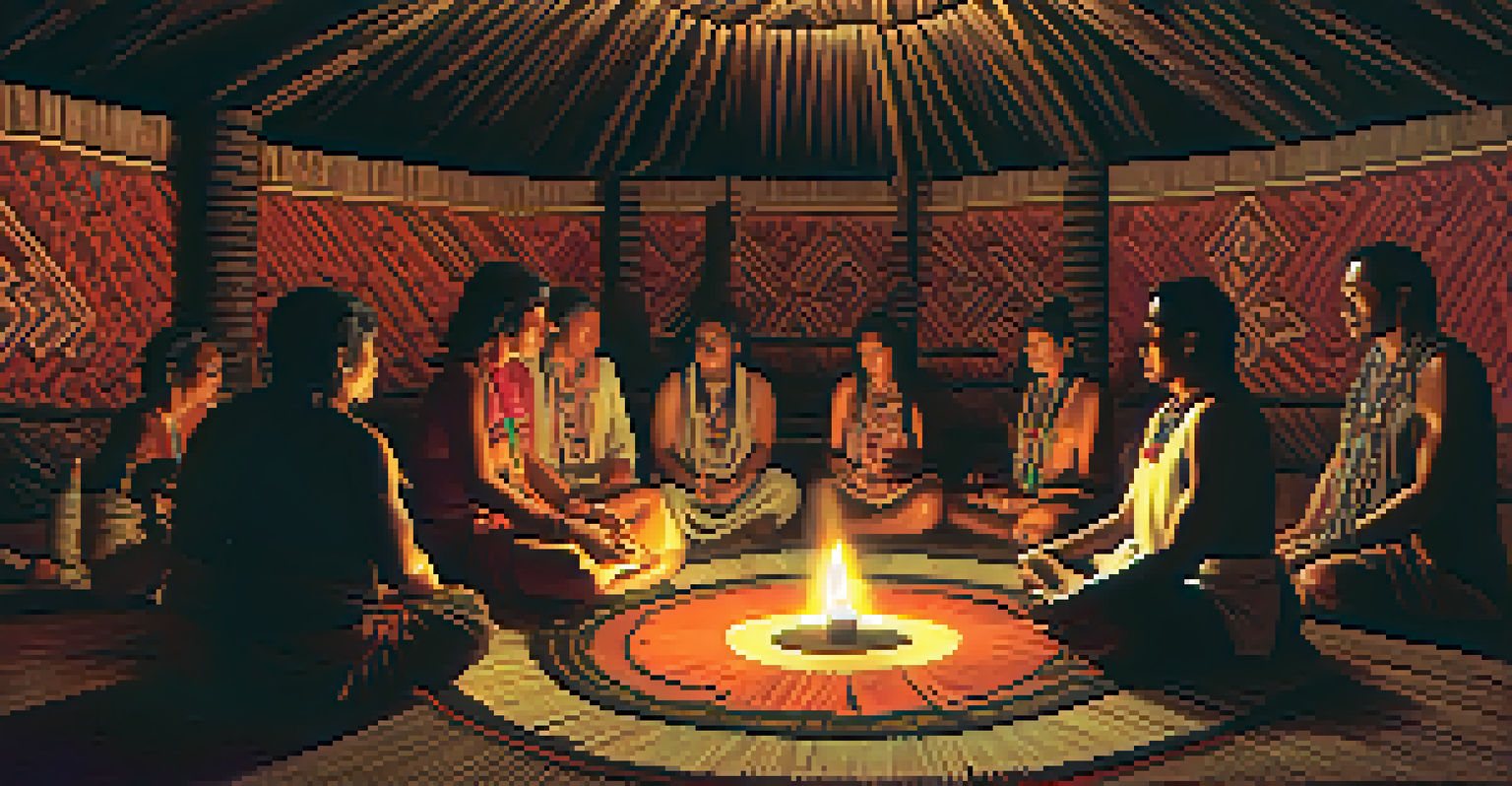Cultural Contexts of Ayahuasca: Future Research Perspectives

Understanding Ayahuasca's Cultural Significance
Ayahuasca, a traditional Amazonian brew, holds profound cultural importance among indigenous communities. It is often used in spiritual ceremonies and healing practices, serving as a bridge between the physical and spiritual worlds. Understanding its role in these cultures is essential for appreciating the depth of its significance beyond mere recreational use.
The ayahuasca experience is not merely about the substance; it is a deeply spiritual journey that connects us to our ancestors and the world around us.
For many indigenous tribes, Ayahuasca is not just a substance but a sacred teacher. The experiences facilitated by Ayahuasca are seen as journeys to gain insight, heal trauma, or connect with ancestral wisdom. This holistic approach contrasts sharply with Western perspectives, which often focus solely on the psychoactive effects.
As globalization spreads, the cultural narratives surrounding Ayahuasca are evolving. It is crucial to recognize and respect these narratives to avoid cultural appropriation and ensure that the voices of indigenous peoples are heard in discussions about Ayahuasca's use and significance.
The Role of Rituals in Ayahuasca Use
Rituals play a vital role in the Ayahuasca experience, shaping how practitioners engage with the brew. These ceremonies often involve specific settings, songs, and practices that honor the plant's spirit and history. The structured nature of these rituals provides a framework for participants to explore their inner selves safely.

In many cultures, the presence of a shaman or facilitator is essential to guide participants through their experiences. This relationship adds a layer of accountability and support, making the ritual a communal activity rather than an isolated one. Such dynamics highlight the importance of cultural context in understanding the Ayahuasca experience.
Cultural Importance of Ayahuasca
Ayahuasca serves as a sacred teacher in indigenous cultures, facilitating spiritual journeys and healing practices.
Future research should investigate how these rituals affect the outcomes of Ayahuasca use. By exploring the interplay between tradition and experience, we can better understand how rituals contribute to healing, transformation, and community bonding among participants.
Modern Adaptations and Global Interest
As interest in Ayahuasca has surged globally, many modern adaptations have emerged. Retreat centers are popping up around the world, offering Ayahuasca experiences that may differ from traditional practices. While this expansion can provide access to healing for many, it raises questions about authenticity and respect for indigenous traditions.
Ritual is the way we enact the sacred, and it is through ritual that we can begin to understand the depths of our own experiences with Ayahuasca.
Some practitioners argue that these adaptations dilute the sacredness of the Ayahuasca experience. However, others believe they can foster greater appreciation and understanding of the brew's cultural roots. This tension between tradition and modernity is a key area for future exploration in research.
It's essential to examine how these adaptations impact both participants and indigenous communities. Understanding the balance between sharing knowledge and preserving traditions will be crucial as the global interest in Ayahuasca continues to grow.
Ethical Considerations in Ayahuasca Research
Researching Ayahuasca inevitably raises ethical questions, particularly regarding consent and the portrayal of indigenous cultures. Researchers must navigate the delicate balance between academic inquiry and cultural sensitivity. Engaging with indigenous communities in a respectful manner is paramount to ethical research practices.
Furthermore, the commercialization of Ayahuasca can lead to exploitation of indigenous knowledge and practices. Researchers have a responsibility to ensure that the benefits of their work are shared with the communities from which these traditions originate. This can help mitigate potential harms and foster equitable relationships.
Role of Rituals in Healing
Rituals are essential in the Ayahuasca experience, providing a structured environment for safe exploration of inner selves.
Future research must prioritize ethical frameworks that honor the perspectives of indigenous peoples. Collaborative approaches, where communities are involved in the research process, can lead to more meaningful outcomes for both researchers and participants.
The Intersection of Science and Spirituality
The growing body of scientific research on Ayahuasca often intersects with spiritual beliefs, creating a rich tapestry of inquiry. Studies have shown potential therapeutic benefits, such as reduced anxiety and depression, alongside profound spiritual insights. This intersection raises intriguing questions about how science and spirituality can coexist in understanding human experience.
Some researchers advocate for an integrated approach that respects both scientific methods and spiritual practices. By acknowledging the subjective nature of Ayahuasca experiences, researchers can provide a more comprehensive understanding of its effects. This approach encourages dialogue between different fields and perspectives.
Future research should explore how these diverse viewpoints can inform one another. Understanding the complexities of Ayahuasca experiences through both scientific and spiritual lenses can lead to enhanced therapeutic practices and greater respect for cultural contexts.
Potential for Healing and Therapeutic Use
Ayahuasca has gained attention as a potential therapeutic tool for various mental health issues. Preliminary studies suggest it may help individuals process trauma, addiction, and anxiety. This potential has sparked interest in understanding how its unique properties can be harnessed in clinical settings.
However, integrating Ayahuasca into mainstream mental health treatment raises challenges. Issues such as standardization of dosage, safety protocols, and trained facilitators need to be addressed. Research must also consider the cultural and spiritual dimensions of Ayahuasca to ensure respectful and effective use.
Ethical Research Practices Needed
Researching Ayahuasca must prioritize ethical considerations, ensuring respect for indigenous cultures and equitable sharing of benefits.
As the therapeutic landscape evolves, there is a significant opportunity for interdisciplinary research. Collaborating with mental health professionals, indigenous healers, and researchers can pave the way for innovative approaches that honor both traditional practices and scientific inquiry.
Future Directions in Ayahuasca Research
The future of Ayahuasca research is bright, with numerous avenues to explore. From its cultural nuances to its therapeutic potential, the possibilities are vast. Researchers are encouraged to adopt interdisciplinary approaches that encompass anthropology, psychology, and pharmacology to gain a holistic understanding of Ayahuasca.
Additionally, there is a need for longitudinal studies that track participants over time to assess the lasting impacts of Ayahuasca experiences. Such research can provide valuable insights into how these experiences influence individuals' lives long after the ceremonies have concluded.

Ultimately, fostering collaboration between researchers and indigenous communities will be essential in shaping the future of Ayahuasca research. By prioritizing respect and inclusivity, we can ensure that this exploration enriches both scientific knowledge and cultural understanding.